Documentary
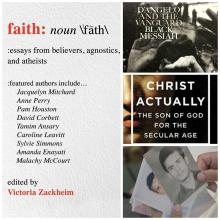
Soulful Protest
R&B singer D’Angelo ends a 14-year hiatus with the album Black Messiah, on which he sings of prayer, love lost, climate change, race, and violence. He asks, “In a world where we all circle the fiery sun / with a need for love / what have we become?” RCA
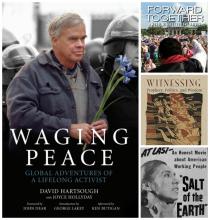
Living God's Reign
In Witnessing: Prophecy, Politics, and Wisdom, edited by Maria Clara Bingemer and Peter Casarella, international scholars write on many aspects of Christian witness, including martyrdom (especially Catholic martyrs in El Salvador), personal narrative, the interlocking realities of God’s beauty and justice, and intercultural dialogue. Orbis
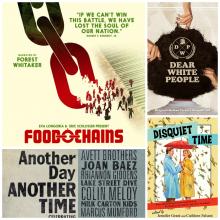
Truth and Satire
The witty film satire Dear White People is a comic entry point into a serious, much-needed conversation about race relations on college campuses. The storylines of four African-American students at a prestigious university spotlight a culture of racism that is easily and dangerously concealed by academia’s progressive posture. dearwhitepeoplemovie.com
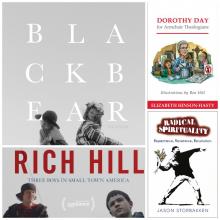
Calling to the Deep
In Radical Spirituality: Repentance, Resistance, Revolution, Jason Storbakken, co-founder with his wife, Vonetta, of the Radical Living Christian community in Brooklyn, N.Y., fluidly weaves scripture work with political critique and his own fascinating history in this call to find deeper life in Christ found on the margins. Orbis
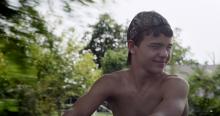
“God has to be busy with everyone else. And hopefully he will come into my life. I hope it happens. It’s going to break my heart if it don’t.”
So says Andrew, one of the three teenage subjects of the documentary Rich Hill, currently playing in theaters across the country. While film refrains from any sermonizing on poverty, or any direct call to action from its audience, it’s mighty hard for socially minded Christians to hear these words and not feel compelled to react. Tracy Droz Tragos and Andrew Droz Palermo’s documentary is an unflinching portrait of poverty in rural America, and its sympathetic portrayals give heartbreaking examples of neighbors in need.
The film follows a year in the lives of three boys: Andrew, Harley, and Appachey. They don’t know each other, but they have much in common. Besides living in the small town of Rich Hill, Mo., all three come from troubled families living well below the poverty line. Andrew is the most hopeful of the group. He’s got a family he loves, and a father who means well, but whose unrealistic dreams keep the family moving from place to place and dodging unpaid bills. Thirteen-year-old Appachey and 15-year-old Harley, however, come from darker situations. Harley is a victim of sexual abuse (his mother is in jail for attempting to kill the man responsible), while Appachey’s violent behavioral issues are simply too much to handle for his single mom, overwhelmed with his siblings and a dilapidated house filled to the rafters with junk.
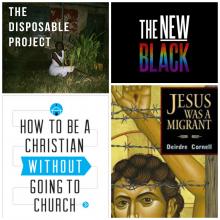
THROUGH THEIR EYES
In 2011, Raul Guerrero provided 100 Kodak disposable cameras and taught basic photography skills to nine young students in the Newlands area of Moshi, Tanzania. The Disposable Project book brings together their images of their community, with text by Guerrero. the-disposable-project.com
JOURNEYING
“Migration has been, for centuries, not only a source of controversy but a source of blessing,” Deirdre Cornell writes in Jesus Was a Migrant. Inspired by ministering among immigrants in different settings, this is a beautifully written set of deeply humanizing reflections on the immigrant experience and Christian spirituality. Orbis Books
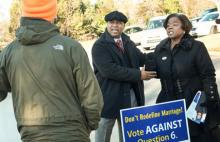
Yoruba Richen’s documentary “The New Black” airs this month online and on television through the PBS series “Independent Lens.” The film, which explores the intersection of race, religion, and sexuality, also has been screened at Chicago’s Trinity United Church of Christ and New York’s Union Theological Seminary. An African-American lesbian, Richen talked to Religion News Service about the new openness she sees in black churches around the issue of same-sex marriage.
"Here's how you bring light into the world," says a scruffy-bearded man in shirtsleeves and a knit cap on a Brooklyn rooftop. "First, you get up in the morning and you scream!" His mischievous grin melts into something more ethereally content as he screams. At length.
He's had plenty of practice screaming — he does it for a living.
The man is Yishai Romanoff, lead singer of the hassidic punk band Moshiach Oi and one of the half-dozen artists, activists, and culture-makers profiled in the documentary Punk Jews.
The phrase can seem like an oxymoron: The essence of punk is to challenge inherited convention, yet adherence to rich traditions of convention is the common through-line of all of Judaism's myriad flavors.
What does it take to educate and parent African-American children, all while maintaining family values?
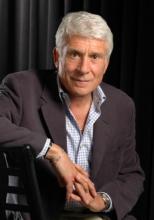
A new film charting Charles Darwin’s passage from Christian to nonbeliever propelled its maker on a similar journey.
“Questioning Darwin,” a new, hourlong documentary airing on HBO throughout February, juxtaposes the story of the 19th-century British naturalist with looks into the lives of contemporary American Christians who believe the world was created in six days, as described in the Book of Genesis.
Antony Thomas, the 73-year-old British filmmaker behind the camera, said while his goal was to highlight the way his subjects answered big questions about the origins of life, a loving God, and the purpose of suffering, he found his own answers to those questions changing.
“This is a personal feeling, but I do believe the two [a belief in God and in evolution] are not compatible,” Thomas said by telephone from New York, where he is working on another documentary. “And that is what made this worthwhile for me.”
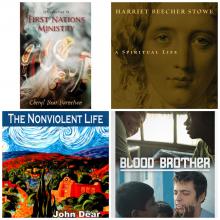
Faith and Reform
Writer and social reform Harriet Beecher Stowe’s controversial 1852 novel Uncle Tom’s Cabin brought many people to the anti-slavery movement. In Harriet Beecher Stowe: A Spiritual Life, biographer Nancy Koester illuminates the shifting role and expression of faith in Stowe’s personal and public life and work. Wm. B. Eerdmans
Falling into Love
A few years ago a young man named Rocky Braat left Pittsburgh to wander India; he’s ended up working for years in an orphanage for HIV-positive children there. His friend, filmmaker Steve Hoover, went to explore why. The result is a Sundance-award-winning documentary, Blood Brother. www.bloodbrotherfilm.com
Spirit Connections
Some Western and global South churches have established “sister church” relationships as a more mutual alternative to the old mission field approach. Drawing on fieldwork and interviews, Janel Kragt Bakker studies the give and take of this model in Sister Churches: American Congregations and Their Partners Abroad. Oxford
Border Clashes
The documentary The State of Arizona captures multiple perspectives on undocumented immigration in the aftermath of Arizona’s controversial Senate Bill 1070, dubbed the “show me your papers” law. Directed by Catherine Tambini and Carlos Sandoval, it will premiere on PBS’s Independent Lens series on January 14 (check local listings). communitycinema.org
Still Shining
David Hilfiker is a retired inner-city physician and writer on poverty and politics who has Alzheimer’s. He writes about his experience, with the hope of helping “dispel some of the fear and embarrassment” that surrounds this disease, on his blog “Watching the Lights Go Out.” www.davidhilfiker.blogspot.com
Transported
Laura Mvula is a British, classically trained musician, songwriter, and former choir director whose debut album,Sing to the Moon,is a lush fusion of soul, jazz, gospel, and pop. While not overtly “about” faith, her arrangements are imbued with spiritual longing and visions of beauty. Columbia
Cleats and Dignity
The civil rights struggle for African Americans happened in every sphere of life. Breaking the Line: The Season in Black College Football That Transformed the Sport and Changed the Course of Civil Rights, by Samuel G. Freedman, tells of two great black coaches in the tense year of 1967. Simon & Schuster
Catching Fire
One project of the USC Center for Religion and Civic Culture is the Pentecostal and Charismatic Research Initiative, which funded research in more than 20 countries. PCRI resources include the informative recent report, “Moved by the Spirit: Pentecostal and Charismatic Christianity in the Global South.” crcc.usc.edu/pcri
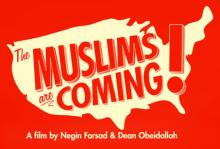
Muslim stand-up comedy is nothing new. But what makes “The Muslims Are Coming” different is that it portrays what happens when a troupe of comedians performs before red state Americans in such places as Tennessee, Georgia, Alabama, Mississippi, Florida, Arizona, Utah and Idaho.
The documentary by Negin Farsad, an Iranian-American, and Dean Obeidallah, of Palestinian-Italian roots, opened in Chicago yesterday.
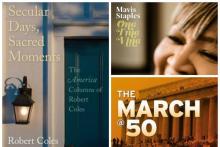
The Dream at 50
This August marks the 50th anniversary of the historic March on Washington for civil rights for African Americans. PBS will feature special broadcast and Web programming, including the premiere of the new documentary The March onTuesday, Aug. 27 (check local listings). pbs.org/black-culture/explore
The Miracle of Meaning
Secular Days, Sacred Moments: The America Columns of Robert Coles, edited by David D. Cooper, collects 31 short essays by the respected child psychiatrist and Pulitzer Prize-winning author. Whatever the topic, Coles offers thoughtful insights on civic life and moral purpose. Michigan State University Press
A Terrible Thing to Waste
Many U.S. children living in poverty are further penalized by struggling public schools. Nicole Baker Fulgham, former vice president of faith community relations at Teach for America, offers passionate, practical solutions in Educating All God’s Children: What Christians Can—and Should—Do to Improve Public Education for Low-Income Kids. Brazos Press
Holy Disruption
The documentary Bidder 70 tells the story of a different kind of civil disobedience: Tim DeChristopher helped save 22,000 acres of Utah wilderness by outbidding industry figures at a disputed Bureau of Land Management oil and gas lease auction, with no intention of paying or drilling. www.bidder70film.com

We started making our new documentary “Redemption of the Prosecutor” for the same reason we always do: someone told us a story.
Bill Mefford works in the social justice office of the United Methodist Church, and he called us last August to say he’d just seen an amazing talk. The talker was one Preston Shipp, a devout Christian and former prosecutor from Nashville who went into a local prison to teach. When Preston heard the inmates’ stories, he began to realize how unjust the system was. He was especially torn up about an inmate named Cyntoia, who was Preston’s star student and had received a life sentence as a juvenile. Preston underwent a spiritual crisis that boiled down to a fundamental question: “How can I reconcile the job I was being asked to do as a prosecutor with my faith in Jesus, who proclaimed release for prisoners?” We won’t give away the ending, but there’s a surprising twist that left us saying this is a story that needs to be told in churches across America.

At the Full Frame Film Festival in Durham last week, I saw Marco Williams’ new documentary, The Undocumented, which tracks migrants as they hike into the United States across the border between Mexico and Arizona, trying to escape the detection of border patrol agents, and trying to survive the deadly heat of the Sonoran desert.
The documentary follows a young man, Marcos Hernandez, as he tries to find his father, Francisco, who was last seen in the desert walking for days in the 120-degree summer heat. Francisco left their home in Mexico with a coyote — man he paid $2,000 to lead him across the border — to make enough money to pay for his son’s expensive dialysis treatments. But he never called; he never returned. The coyote reported that he left Francisco in the desert because he was sick and couldn’t keep up with the other migrants in the group. Marcos fears the worst — that his father died of dehydration, of heat exhaustion. But to confirm the death he has to find the body.
The filmmaker focuses on the morgue in Tucson, Ariz., where the medical examiner investigates human remains, looking for clues that would help identify the dead in order to return whatever is left to family members and friends, to provide some kind of closure, to honor the dead with a burial.
In the film, Marcos won’t believe his dad is dead until he can see his dead body, or whatever is left of his body — a skull, teeth, his rib cage. He will not believe unless he can see.
“Unless I see the mark of the nails in his hands, and put my finger in the mark of the nails and my hand in his side, I will not believe” (John 20:25). That’s what Thomas says to the other disciples about the resurrected Jesus; and what Thomas says about needing to see the body reminds me of the story of Marcos, about the need to see in order to believe.
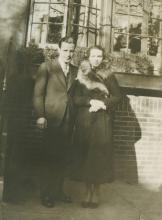
Gilbert and Eleanor Kraus lived a comfortable life in 1930s Philadelphia, where he made a good living as a lawyer, and she kept a stylish house.
They were secular Jews who sent their children to a Quaker school, and unlikely candidates for the mission they assigned themselves. Gilbert revealed the plan to his wife as he was shaving in the bathroom, so their young son and daughter would not hear.
He wanted to go to Vienna and save 50 Jewish children from the Nazis.